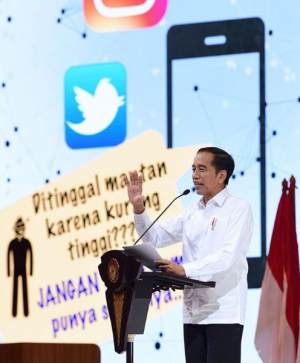Indonesia has kicked off the year with gusto. President Joko “Jokowi” Widodo, now in his second and final term, is expending the last of his political capital to push through a series of badly needed structural reforms to help jumpstart Indonesia’s flagging economy. The proposed omnibus bills will cut and streamline regulations and loosen labor laws. The impact and importance of these bills cannot be understated. They will have a profound and long-lasting impact on Indonesia’s economy that will last decades. Even if the proposed bills, which must now clear the House of Representatives (DPR), get watered down by politicians with invested interests in Indonesia’s protected sectors, listed in the infamous negative investment list, the overall direction of these reforms will have a transformative impact. This is Indonesia’s big economic shakeup, on par with the free-market reforms that Margaret Thatcher and Ronald Reagan pushed through the United Kingdom and the United States in the 1980s, although with Jokowi’s typically calm and understated Javanese touch.
Taking a conservative view, in which the bills get stripped down to their core components, business and investors can still expect to see a much greater degree of freedom as Jokowi opens up restricted economic sectors to foreign investment. This is likely to include financial services. (Incidentally, since financial services are the U.K.’s biggest global export, post-Brexit Britain may want to consider prioritizing a free trade agreement with Indonesia, predicted to be the world’s fourth-largest economy by 2030, before the likes of Fiji and Australia.)
Indonesia is lucky to possess some of the most entrepreneurial people in the world. Rags-to-riches stories adorn the pages of Indonesia’s rich lists, with billionaires literally pulling themselves up from gut-wrenching poverty to the glittering skyscrapers that makeup Jakarta’s skyline today. The American dream may now be dead but the Indonesian dream, it would seem, is very much an achievable reality as Southeast Asia’s mega economy climbs the global GDP rankings.
It is for this reason that it is shameful that Indonesia scores so badly on the OECD’s PISA global education rankings, considering Indonesia has 260 million people that are all capable of achieving greater heights in their lives and living out their dreams.
There is no longer an excuse for the massive underinvestment in education. Indonesia is no longer poor. It is not a developing nation. It is one of the fastest-growing economies in the world, with or without Jokowi’s omnibus bills. Indonesia does have the means to invest in its education system and its future. It currently stands as the 14th richest country in the world and one of the biggest of the Asian “emerging markets,” often overlooked, even by former Goldman Sachs and University of Sheffield Economics Alumni Jim O’Neill, who coined the BRIC term. The masters of the universe have neglected the far Far East in their growth market projections but Indonesia is also shamefully neglecting the potential of its people and failing to invest in its future.
Jokowi did make a bold move, which caught most of Jakarta’s alleged political analysts off guard, by giving the education minister portfolio to Nadiem Makarim, former McKinsey consultant and the founder of Indonesian tech darling and decacorn, Gojek, a ride-hailing app. Indonesia’s education system badly needs modernizing, and putting a tech-savvy business leader at the helm seems like a good start. Indeed, all authoritative research states that the jobs of the future will be in technology — specifically coding, artificial intelligence, and data analysis. Put simply, this is where Indonesia needs to put its rupiah in order to effectively invest in its future generations. Jokowi has signaled his intent in appointing Nadiem, but a complete overhaul of teacher training and the Indonesian curriculum is needed. The commitment has been made to start the process, but without long-term significant investment in education, Indonesia will hamper the potential prospects of its future generations. One might say that Indonesia badly needs an education omnibus bill too.
Indonesia is currently living through its much-vaunted demographic dividend. The demographic dividend is today, not tomorrow. If the government fails to reform the business environment, make structural adjustments to the economy, and modernize and upgrade the Indonesian education system for a future in which countries will compete for investment based not on cheap labor but brainpower, Indonesia will not gain from its youthful workforce. These Indonesians need jobs and preferably well-paying jobs. We live in a globalized and interconnected economy where high economic value is added by smart thinking. Indonesia needs to invest in value-added manufacturing, technology, and services today, to reap the economic rewards tomorrow and provide good jobs for the millions of freshly minted graduates who join the labor market each year. If Indonesia does not, the demographic dividend could well turn into a demographic disaster.
Indonesia faces the very real danger of falling into the middle-income trap, and once in, it will be extremely challenging to get out. Hobbled by selling its natural resources to the highest bidder, providing low skill, low added-value manufacturing, and toiling in the fields producing low-value agriculture products, Indonesia faces the very real prospect of being stuck in the global economic middle, neither poor nor rich. This would be a tragedy. Indonesia can do a lot better.
Indonesia needs to decide if it wants to realize its abundant potential. It is there for the taking but the window is closing. Jokowi has built a strong and competent team of ministers for his second term team. His administration has done more than the previous administrations of former presidents Susilo Bambang Yudhoyono and Megawati Sukarnoputri combined to kick start the economy and make the necessary structural adjustments to propel Indonesia into the global economic big league. However, goals without actions are just goals. Indonesia has the potential but it needs to continue to be bold to climb the global economic ladder. The golden opportunity is today; Indonesia needs to seize the moment.
Edward Parker is a writer and consultant, based in Jakarta. He can be followed on Twitter @EdinIndo

































